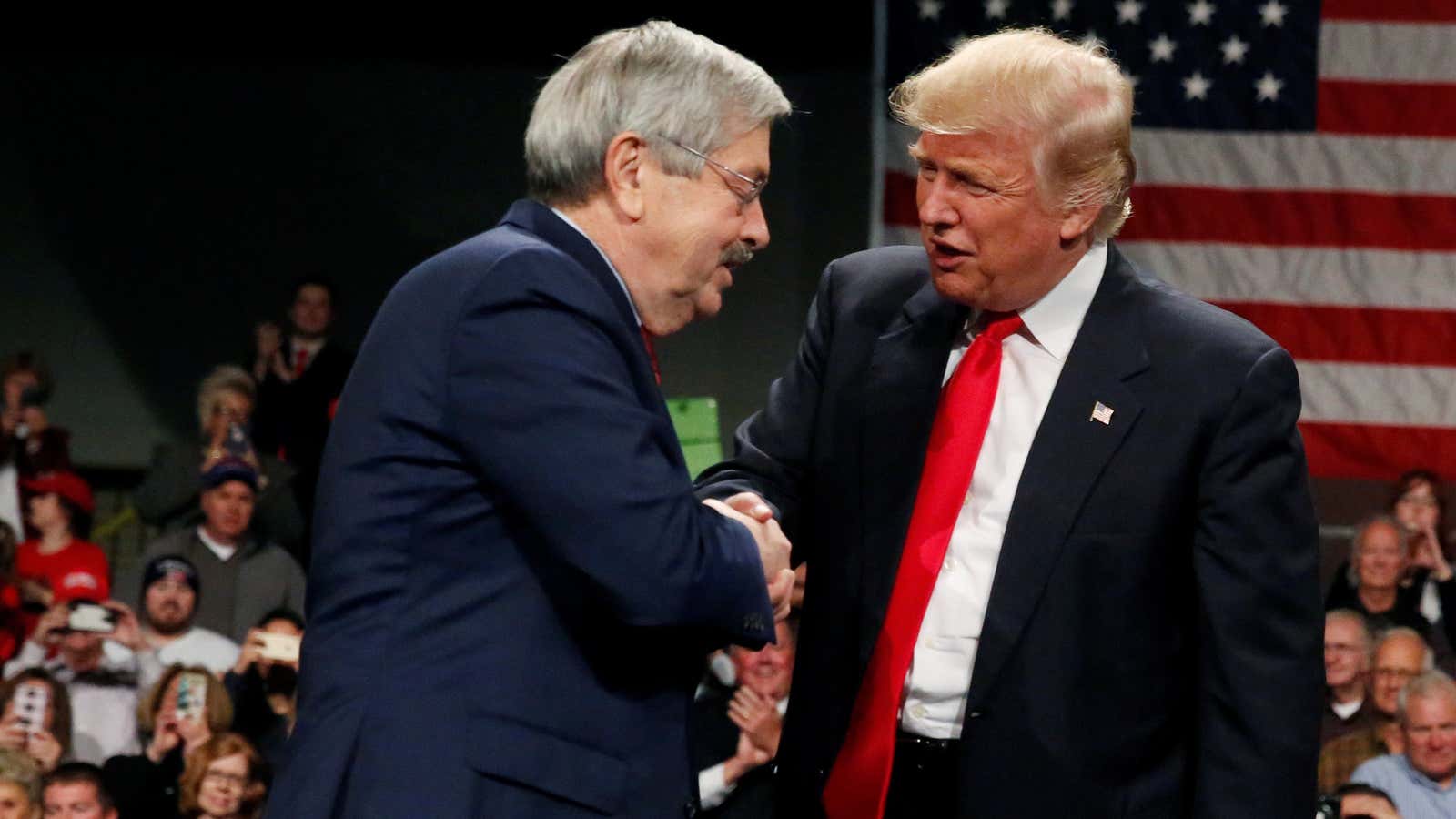US president Donald Trump will be hosting China’s president Xi Jinping at his Mar-a-Lago Florida private club, possibly as early as the first week of April, online media outlet Axios first reported. While prepping for the visit, though, the US president won’t be able to count on on-the ground insights from his chosen ambassador to China, since Terry Branstad is still governing Iowa.
The US has said it hopes the meeting will be a chance to address tensions in the US-China relationship over how to deal with North Korea, and over the deployment of a U.S. missile defence system in South Korea, another place where the US doesn’t presently have an ambassador. The White House didn’t immediately respond to a request for comment on diplomatic nominations and on Branstad’s confirmation process Tuesday (March 28).
“It’s the purpose of this meeting, of that kind of a meeting, to help defuse tensions over North Korea and the recent deployment of a THAAD military battery to South Korea,” White House press secretary Sean Spicer told reporters on March. 13, in relation to the Xi visit, without confirming the dates.
Trump announced even before taking office that he was appointing Branstad, the Republican governor of Iowa and an old friend of Xi, to be ambassador to China, but Branstad hasn’t yet been confirmed by the US Senate. Branstad’s name went on Jan. 20 to the Senate Foreign Relations Committee, chaired by Republican Bob Corker. Republicans have a majority in the Senate, but a hearing date has not yet been set.
That’s because “Governor Branstad’s file is not complete,” said Sean Bartlett, spokesman for Ben Cardin, the top ranking Democrat on the committee. That means the committee “has not received all his paperwork from the Office of Government Ethics,” Bartlett said. “So there’s a delay either at the White House, State, or the OGE.”
Earlier, in relation to other confirmations, Republicans have blamed “minority” committee members—read Democrats—for delays, by being sticklers on things like background checks. But the delay isn’t only on the Senate end. For many ambassadorial positions, nominations haven’t been made yet. (The Washington Post is keeping a running tally of nominations, confirmations and inaction.)
Branstad, meanwhile, told reporters in February that he was “still focused on my job as governor.” In early March, local news station Radio Iowa reported that the governor expected the confirmation could take place in late April. “I’m thinking it’s going to be late April, maybe early May,” Branstad told the radio station after a visit to the capital. “But as soon as I am confirmed, then shortly thereafter it would be my intention to resign and be sworn in as the ambassador.”
Ben Hammes, communications director for the governor’s office, said Tuesday a hearing date had not been set, and added that “we have completed all the paperwork to the extent that we are required. Meaning, we have turned in everything to the White House.”
It’s not just China that lacks an ambassador. Across Asia, many posts are empty after a slew of ambassadors appointed by former US president Barack Obama were ordered to depart as Trump took office. Vacancies in Asia also include Japan and India, according to the latest list from the State Department. While Trump has just nominated an ambassador to Japan, there is no nominee for Korea. Elsewhere in the world, there is no nominee for Saudi Arabia.
A lack of US ambassadors in key countries across the world isn’t just a Trump problem, though. Six months into his first term, Obama didn’t have an ambassador in Beijing. It wasn’t until August 2009 that Jon Huntsman (paywall), Republican governor of Utah when he was nominated in May, began serving. Japan, meanwhile, was also vacant from the inauguration till August, when John Victor Roos took up his post. (Obama could at least count on an envoy in Korea though, who was in place from September 2008 and remained in her post.)
Then secretary of state John Kerry complained in 2014 that a quarter of countries did not have a U.S. ambassador.“We’re going without our strongest voice on the ground every day in more than 25 percent of the world,” Kerry said at the time. “We cannot lead if we are not there and we can’t be there if the Senate won’t confirm our best and brightest.”
Queried about how countries lacking a top diplomatic representative from the US might view these vacancies, the State Department said via email that “Acting career professionals are currently fulfilling positions as needed.”
Trump’s proposed 28% budget cut to the State Department isn’t likely to help with what some are calling the State Department’s “Ghost Ship” problem.
Max de Haldevang contributed reporting.
